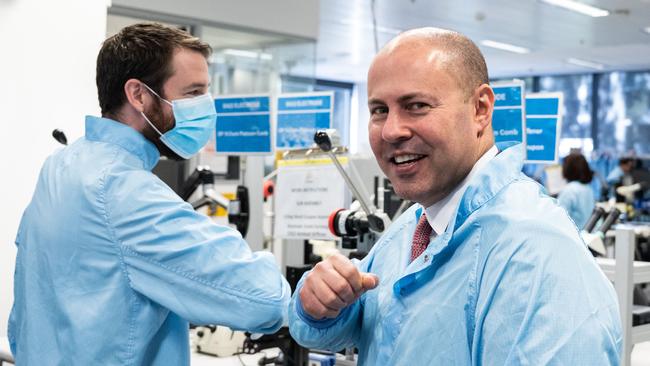We’re all ears: tech plan wins over business
Bionic ear maker Cochlear has backed Josh Frydenberg’s ‘patent box’’ tax break for innovation predicting it could create more highly paid jobs in Australia.

Bionic ear maker Cochlear has backed Josh Frydenberg’s “patent box’’ tax break for innovation predicting it could create more highly paid jobs in Australia.
Cochlear chief executive Dig Howitt said the proposed patent box legislation was an “opportunity for Cochlear to solidify our future in Australia, but more importantly to create new companies to grow in Australia”.
Mr Howitt said these companies would provide highly paid jobs.
Speaking at the bionic ear company’s Sydney office in Sydney on Tuesday, the Treasurer said: “We know capital is very mobile and businesses like Cochlear are sought out by governments and countries right around the world, but we want to keep this wonderful innovation and technology in Australia.
“We want to see it derive more export income, but importantly create more jobs and high-paying jobs here.’’
Business Council of Australia chief executive Jennifer Westacott said she backed the measure. “To take advantage of our head start in the global recovery we need more initiatives like this to position ourselves to come back stronger, more competitive and smarter than before the pandemic,” Ms Westacott told The Australian.
However a leading academic argued the plan would fail to attract early-stage funding for new inventions.
Professor Beth Webster, director of the Centre for Transformative Innovation at Swinburne University of Technology, said the patent box policy would not trigger a new wave of research and development, but made sense in the context of a global “race to the bottom” as countries jostled to attract inventions via tax breaks.
Her comments echoed the findings in a 2015 study into the potential impact of a patent box in Australia by the Office of the Chief Economist for the Department of Industry, Science, Energy and Resources.
That report found “there are no solid theoretical or empirical grounds for claiming that patent box regimes induce innovation”.
However Professor Webster said it was necessary as countries vied to offer the most compelling incentives to nurture innovators and attract overseas talent. The patent box, announced in last week’s federal budget, will give entrepreneurs a 17 per cent tax rate on earnings attached to an innovation or patent. The policy aims to encourage innovators and entrepreneurs to commercialise intellectual property in Australia, rather than overseas in places such as Silicon Valley.
When implemented on July 1, 2022, Australia will join countries including the US, Britain, China, Belgium, Hungary and Switzerland, which have all introduced similar legislation.




To join the conversation, please log in. Don't have an account? Register
Join the conversation, you are commenting as Logout